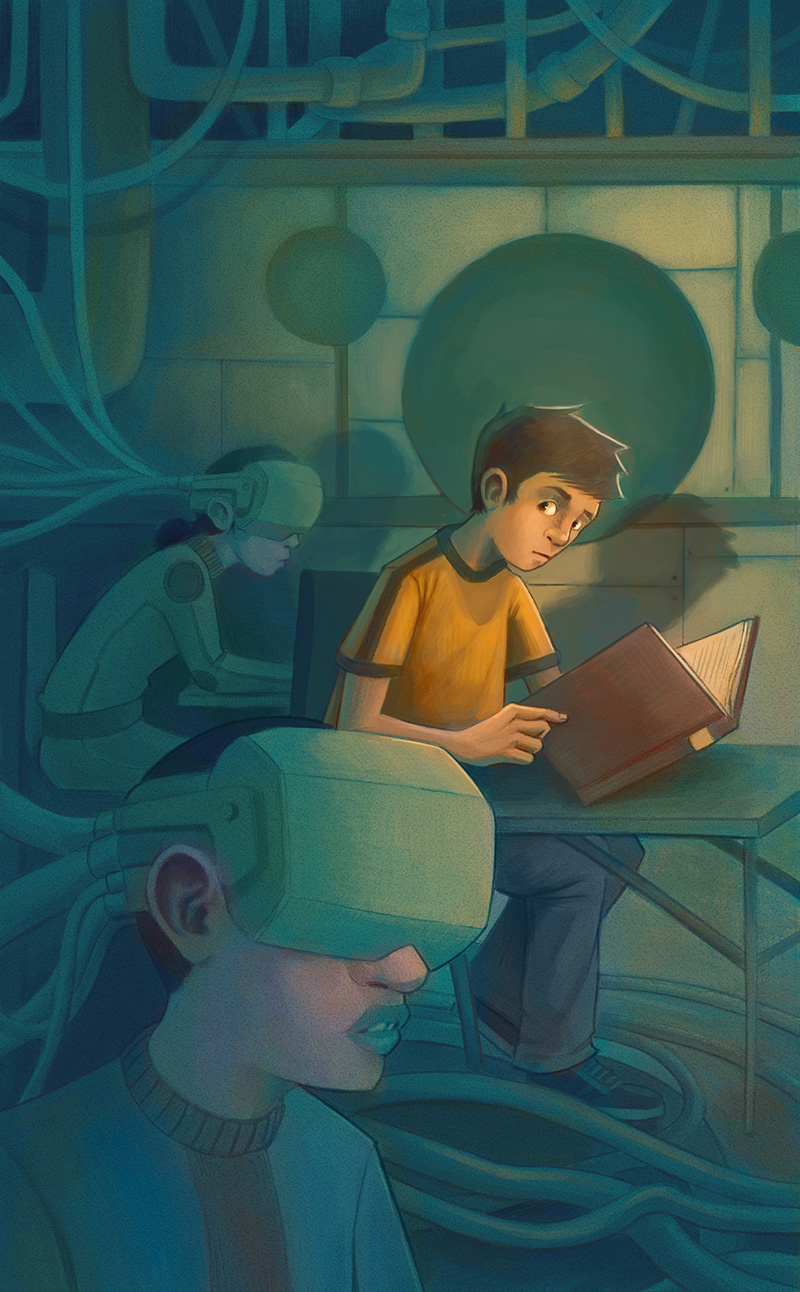The Death of Social Interaction: How Smartphones and Screen Time Are Destroying Human Connection
Guest blogger Barlow Crassmont
It’s lunchtime in Tieling, China, a small city in Liaoning Province in the far northeast. I visit the Uyghur’s restaurant most Mondays, located half a kilometer from my apartment. Their food is superb, especially considering the affordable (next-to-nothing) prices. The owner instantly notices me—it’s hard not to. I’m the only non-Asian Westerner in the wider area. He nods, smiling, and I reciprocate. There’s a quiet understanding between us. Since trying the vegetable-and-rice dish (potatoes, peppers, beef, onions) in mid-2024, it’s the only thing I’ve ordered when visiting his place. And I do it without uttering a single syllable or gesturing toward the large menu board.
I select a table next to the large air conditioner. I’m hot and sweaty, my arms and neck noticeably wet. But I’m willing to risk pneumonia if it means I’ll cool down momentarily, at the very least. Not two minutes later, a quartet of teenagers enters the place, their arrival as boisterous as a collective coughing fit. They sit at the table next to me, giggling like children half their age at the sight of me. The presence of a foreigner in their little town is equivalent to spotting a Bigfoot. One points at me and whispers something to his friends. Extended stares are thrown my way, ad nauseam.
Luckily, my food arrives soon after, providing a worthy distraction from their unabashed ogling. I eat quietly, minding my business, thinking about what direction my latest fiction piece should take. Just for spite, I occasionally glance back, wondering if I’m still the focus of their adolescent wonder. That’s when I notice the strangest thing.
Their stares have been redirected. Not at another person—but at another thing. Their phones. They utter not a word to each other, each of them playing different videos out loud, sans headphones. This goes on for the remainder of my lunch—fifteen, maybe twenty minutes. I finish, pay my bill, and by the time I leave, the boys still haven’t conversed, choosing instead to engage in the world of cyberspace and TikTok videos and who knows what else, in lieu of human company.
Loss of Human Connection in the Age of Smartphones
What I witnessed that day was hardly an isolated incident.
Although human interaction has become a common casualty of smartphones the world over, it is particularly troubling across Asia—especially in China, where recording oneself saying something quirky is a favorite pastime of hundreds of millions. Becoming the next viral influencer could propel one’s social standing from a meager lower-middle-class commoner, sharing a small apartment with several individuals, into an overnight celebrity whom affluent sponsors cannot ignore. Fame, fortune, real estate, fancy cars. There’s a chance—albeit a small one. But the only way to stand out among hundreds of millions of daily uploads is to keep trying, keep creating, keep hoping to go viral.
Yet for the affluent Chinese—those whose family connections and government ties ensure they have nothing to worry about for generations to come—watching endless videos and commenting on countless posts is merely a way to pass the time. Once, conversation or a compelling book would suffice. But not anymore.
The situation is hardly better among the upper class. At the private English school where I teach, I often see parents sitting in the lobby, waiting for their children’s class to finish. On a typical day, I’ll run across three dozen, at least. Not once have I seen them converse with each other. Instead, during the entire sixty minutes they spend waiting for their child’s class to complete, they’re glued to their devices. Their “enchantment” is hardly enviable; quite the contrary. Chinese adults who can afford private English classes for their sons and daughters are a minority. Surely some could find common topics to discuss with their fellow citizens. Something along the lines of, How long has your boy/girl been learning English? How do they like it? Do you see them studying abroad one day?
Unfortunately, the most I’ve ever heard is a subtle hello or an occasional goodbye as I pass.
How Smartphones Affect Youth in China
And the younger generation? They’re growing up holding their mother’s tablet or father’s smartphone, staving off boredom at restaurants, in bank lines, at the supermarket. Modern parents, often overworked and exhausted, are too quick to redirect their children’s complaints to the portable black mirror in order to give themselves a reprieve from the hardships of parenting, however brief. But there’s a consequence to such carelessness. The majority of the children, unfortunately, are losing their grip on social interaction. Instead of playing outside, like kids of my era, today’s youth are hooked on screen time, like lifelong friends to an illegal substance. If their habits remain unchanged, they’re liable to succumb to obesity, eye strain, sleep deprivation, and chronic neck and shoulder pain from hours in poor posture.
Screen Time and Mental Health Effects
And those are just the physical side effects. Mentally, the prognosis is worse. New studies show excessive screen time leads to stress, anxiety, and depression. It ruins attention spans and makes focusing on even simple tasks difficult.
Therefore, to all those naysayers who are quick to dismiss the imminent takeover of AI as nothing more than a fear inspired by too many post-apocalyptic sci-fi movies, I say: if it already has your undivided attention—and clearly it does—then hasn’t it already taken over, in some form?
“The Boy from Elsewhen”: A Look at What Could Be
As you’ve probably figured out, I didn’t need much inspiration to write “The Boy from Elsewhen”—a winning story in L. Ron Hubbard’s Writers of the Future Volume 41—other than being an observant citizen in modern society.

Art by Daniel Montifar
In my story, a time-traveling boy, Visar, from another era, accidentally finds himself in a futuristic society where public education has changed. Instead of reading, writing, and oral learning, students wear large helmets bristling with cables. Their minds, like computer processors, are upgraded daily. Knowledge is injected as updates. Books are only a memory.
As a teacher, I’m perhaps more qualified to comment on the shrinking attention spans of modern children. Needless to say, they’re shorter than any generation prior. Most of my students can’t pay attention for more than a few minutes, and that’s on a good day. Any video I show might emit oohs and aahs, but only briefly.
A friend recently told me his eight-year-old son had, in one single day, spent twelve straight hours watching YouTube Shorts, pausing only to eat and use the restroom. After hearing this, I struggled to sleep for days, worried about the future generations’ prospects when they come of age. At a time when optimism is needed most, the dominance of shiny, colorful, high-definition screens makes me fear books may never reclaim their charm.
Life Goes On—AI Be Damned
But alas, all this typing and pessimizing is making me hungry. It’s time I return to my favorite Uyghur restaurant. I just hope I see more human interaction among its patrons than last time—though I won’t hold my breath.
Either way, fingers crossed.

Barlow Crassmont, author of “The Boy from Elsewhen” featured in L. Ron Hubbard Presents Writers of the Future Volume 41
Armand Diab (pen name: Barlow Crassmont) has lived in the USA, Eastern Europe, the Middle East, and China. When not teaching English or writing speculative, fantasy, and science fiction, he dabbles in juggling, solving the Rubik’s Cube, and learning other languages (his Spanish is coming along nicely).
He has been published by the British Science Fiction Association, in Wilderness House Literary Review, and in Dark Speculations: Volume 1 by Little Red Publishing.
“The Boy from Elsewhen” was inspired by the current social climate across the globe. Armand says, “Everywhere one goes, regardless of country or nation, most people are endlessly staring at their smartphones, unable to look away, and often neglecting other humans around them for the sake of technology. As the dominant species on Earth, we are becoming too dependent on our handheld devices, but are no smarter for it. In fact, I feel if the trend continues (and I see no evidence that it won’t), future generations won’t be able to construct a single solitary thought without AI’s assistance. Let’s hope that day, at least, is in the far-distant future, after me and mine are long gone.”
Other articles and resources you may be interested in:
A Library Between Two Covers: L. Ron Hubbard Presents Writers of the Future
Hard Science Fiction, Nomads, and Metaphors
Leave a Reply
Want to join the discussion?Feel free to contribute!




Excellent article Mr. Diab ! As a politically far Left Progressive I was taken a back by your description of the teenaged boys in the restaurant locked onto their phones. So, no future Mao in that crowd ? I am surprised that the Chinese Communist Party isn’t surrounding them with propaganda , trying to get them into the army or to study engineering or computers ? I have read a fair amount on The Long March and the revolution in 1946 to 1949 and Chiang Kai Shek so do have hundreds of questions about China and life there. I will come back to Galaxy Press to catch your next article. Sincerely,howard White ,Columbus Ohio.
I’d love to see articles on this same topic every month. There is much more that can be said about the freedoms and pleasures that are dwindling, and the fight for our minds that is escalating.